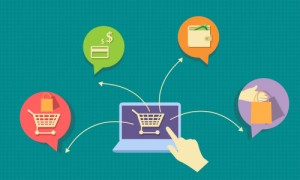In this blog post, Rohan Chawla, a student of Delhi University who is currently pursuing a Diploma in Entrepreneurship Administration and Business Laws from NUJS, Kolkata, discusses the importance of cyberspace for economic growth and development.
There seems to be a ‘cyber’ version of everything today. Cyberlife, cyberadvocacy, cyberbullying, cybercrime, cyberwar, cyberculture, cyberlawyer, cybereconomy, cyberethics, et al. Even as we are increasingly coining terms, there is very little clarity as to what these terms exactly mean. Does the word cyberspace refer only to the internet? Or does it also include spectrum and airwaves? Is the term cyberspace country specific? Through this article, I shall first attempt to clarify what is ‘cyberspace’ and then go and show its impact on economic growth and development.
The Oxford Dictionary defines ‘cybersapce’ as the notional environment in which communication over computer networks occurs[1]. India’s National Cyber Security Policy, 2013[2] defines ‘cyberspace’ as a complex environment consisting of interactions between people, software, and services, supported by worldwide distribution of information and communication technology (ICT) devices and networks[3]. The UK Cyber Security Strategy defines ‘cyberspace’ as an interactive domain made up of digital networks that are used to store, modify and communicate information. It includes the internet, but also the other information systems that support our businesses, infrastructure and services[4].
Thus, in layman’s terms, ‘cyberspace’ would refer to the interaction and communication through/on the internet (or other shared network). The space referred therein is the Internet or other shared network[5].
What is the impact of cyberspace on economic growth and development? For starters, cyberspace has no physical barriers and hence is not restricted by territorial limits. A service provider in one part of the world can freely provide his services to a person sitting in a different part of the world. If the goods/services are in electronic form, then the trade between the two persons can be conducted without any physical exchange[6]. Outsourcing boom in India is a testimony to the fact that services can be effectively outsourced across oceans. Even though the parties are geographically removed, they are connected via cyberspace. Regarding economics, this helps bridge demand and supply inefficiencies.
Cyberspace is also a leveling medium. Each connected to the internet can avail everything that the internet has to offer (freely and fairly). The rules of the game are equal for everyone. Cyberspace provides an opportunity for everyone to reap its benefits. Million Kitchen[7] is a technology driven home food discovering and ordering platform. It connects home-based chefs with customers seeking home cooked food through the medium of cyberspace. It allows any individual who can cook a clean and healthy meal to earn his/her living. Technology reduces the number of barriers and allows for entrepreneurship. A similar story follows in case of application driven cab services such as Ola and Uber. These startups have enabled car drivers to be entrepreneurs and given them a chance to own a car and run a car service[8]. Through these mechanisms, cyberspace enables promotion of entrepreneurship, creation of wealth and employment and inclusive growth.
Additionally, cyberspace allows for free flow of information and knowledge, enabling all persons to access material across subject areas thereby enhancing their skills and expertise. The advent of online education platforms such as Udemy, Coursera, Khan Academy et al., have enabled people to access knowledge which was earlier localized in universities and schools[9].
Improvement in literacy rates has various follow-up benefits such as improved health, sanitation, cleanliness, gender equity, improved employability, reduced crime, etc. In a modern welfare state, the Government engages in a plethora of activities. Cyberspace promises several benefits in Government to Citizen Transactions. For instance, the Government of India provides for online tax filing, online requests for RTIs (for certain departments), complaint registrations (for some departments), passport application, forest clearance, admission process in some universities, etc. The citizen can access government services at his convenience. However, the greater benefit is that in countries like India, where corruption is rampant, cyberspace is a fair and transparent alternative which is hard to scheme/beat. The government official’s discretion decreases the interaction with the official decreases and hence so does chances of bribery. Leakages are plugged, and the wastage of resources decreases[10]. There are also cost savings that accrue to the government from decreased face to face transactions. The interaction of the Railway Minister[11] and External Affairs Minister[12] with the public through Twitter has saved lives as well.
A word may also be said about online marketplaces. Online marketplaces (such as Flipkart, Amazon, Snapdeal, etc.) allow consumers to compare prices of various commodities and allows them to choose the best deal. It offers products to consumers that may not otherwise be available in the physical marketplace around the consumer’s geography. Additionally, there are specialized B2B platforms that enable purchase and sale of industrial products (such as Industry Buying, Construction Bazaar) and some that enable SMEs to club together and place a large order for their needs (such as Power2SME). The consumer is now spoilt for choice, and that enables better selection in the consumer’s basket.
Payment banks deserve a mention too. Payment banks ensure that money leaves a trail and that the dependence on physical cash decreases. These banks provide incentives to users to pay for services electronically. Not only does that reduce paperwork, but it also enables the government to track transactions. While it is ambitious to say that this will help tackle the menace of black money, but it is a good beginning and deserves mention.
In the end, social media may also be mentioned. Social media has helped in the exchange of ideas and views. A vibrant democracy is crucial for economic growth and development. The concept in itself is a bit fluffy, but there are long-term benefits of idea sharing.
However, cyberspace is not without blemishes. Cyber crime and cyber fraud are commonplace now. Criminals are using the cyberspace to further their nefarious designs. Cyberprivacy is also becoming an increasing issue with identities of persons being stolen. There is a constant attack on government websites and servers, threatening crucial infrastructure that runs the country. There are also instances of cyberwar and cyberterrorism. It appears that the ‘cyber’ prefix has a long way to go. The benefits of cyberspace are several (economic and otherwise), and it does not seem that its end is near.
Footnotes:
[1]http://www.oxforddictionaries.com/definition/english/cyberspace
[2]http://deity.gov.in/sites/upload_files/dit/files/National%20Cyber%20Security%20Policy%20(1).pdf
[3] This definition uses a conjoint version of the term. According to Towards better understanding Cybersecurity:or are “Cyberspace” and “Cyber Space” the same?By Madnick, Choucri, Camiña and Woon (MIT, Nov 2012), there might be certain differences between the terms ‘cyberspace’ and ‘cyberspace’. For this article, we keep aside such differences and use the two terms with reference to the internet.
[4]https://www.gov.uk/government/uploads/system/uploads/attachment_data/file/60961/uk-cyber-security-strategy-final.pdf
[5]For a detailed review of definitions, see the Cisco Blog (July 2012) – Cyberspace – What is it?: http://blogs.cisco.com/security/cyberspace-what-is-it
[6]For more information, see electronic freelance websites such as Up work
[7] http://www.millionkitchen.com/how-it-works/
[8]The Uber and Ola experience is not limited to cab/taxi service. Read Deepak Shenoy’s brilliant article on the varied possibilities and the economics – http://capitalmind.in/2014/11/what-to-make-of-the-richly-funded-taxi-services-uber-and-ola/
[9]You can read a detailed report by SRI Education (March 2014) on the Use of Khan Academy in Schools: https://www.sri.com/sites/default/files/publications/2014-03-07_implementation_briefing.pdf
[10]Estonia is a great example to show how the cyberspace can be leveraged to provide government services. Read this interesting piece for more details – http://www.theatlantic.com/international/archive/2014/01/lessons-from-the-worlds-most-tech-savvy-government/283341/
[11]http://www.ndtv.com/india-news/sos-on-twitter-get-railway-minister-suresh-prabhus-express-attention-1249141
[12] http://indianexpress.com/article/india/india-news-india/sushma-swaraj-does-it-again-helps-out-distressed-indian-woman-in-germany/
 Serato DJ Crack 2025Serato DJ PRO Crack
Serato DJ Crack 2025Serato DJ PRO Crack












 Allow notifications
Allow notifications


